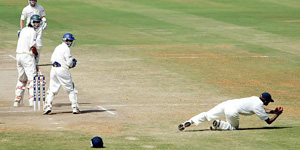COACHING
Fielding in the slips - Other key aspects
The only thing 'certain' for a slip-fielder is 'uncertainty'. A slip-fielder should stand comfortably, the feet placed apart, and the knees a little bent for quick movement. The fielder should try and keep the body and muscles relaxed. A torso that is tense can be the disastrous, and at times, can cause injury or muscle pulls.
Rahul Dravid, arguably the best slip fielder in the world, takes a beauty to dismiss Jason Gillespie
at Chennai.
One of the most important aspects that is often
ignored for reasons of fashion, is the clothing.
Wearing attire that is comfortable rather than
donning stuff that is more stylish albeit tighter,
is an absolute must. A tight-fitting or badly cut
trouser or shirt can hinder easy movement, and this
in turn can lead to an awful display of fielding.
If the fielder is unable to move quickly, then
things can get really embarrassing for him.
Another extremely challenging position in the field is 'leg-slip'. This particular position comes into play most often in Asian countries, which have an abundance of 'wristy' batsmen.
Another extremely challenging position in the field is 'leg-slip'. This particular position comes into play most often in Asian countries, which have an abundance of 'wristy' batsmen.
The slip-fielders on the off side have the advantage of watching the batsman's bat as well as the bowler, whereas a fielder standing at leg-slip has no option but to look in the direction of the batsman, and rely on his reflexes, agility and of course, anticipation.
Leg-slip is synonymous with some terrific catches, which the fielder has clasped off a fast bowler or a spinner. One remembers the catch taken by the substitute Hemang Badani to dismiss Steve Waugh in the second innings of the historic Kolkata Test of 2000-01. Had Badani hot held that difficult chance, Australia might well have drawn the game easily.
Of the seven catches that I took to achieve the world record on my Test debut against England at Bangalore in 1976-77, the one I treasure most is the chance I held at leg-slip. The batsman was Dennis Amiss and the bowler Karsan Ghavri. The bat-pad catch that came my way had me diving full-length forward. I still cannot understand how the ball that seemed far away, rested on the edge of my fingers without spilling. The thrill of clinging onto half-chances like that is what makes life as a fielder worth living!
On the other hand, I can never forget the catch that I dropped of Allan Border off Kapil Dev at leg-slip in the 1979-80 series. Sunil Gavaskar, our captain, had watched the young Border in action and devised a plan to get him out in the leg-trap off Kapil's wonderful inswinger to the left-hander. We decided that in the first over that he faced off Kapil, the fourth ball should tempt him to play his favourite flick. Kapil bowled the first three deliveries outside the off-stump, and the plan was on. A signal was made, and there I was, waiting for Border to fall for the bait. Well, believe it or not, he did exactly that and I saw the ball come quickly, but straight at my chest. I made the cardinal sin of getting over-excited, and in my hurry to snatch at the ball, it bounced out of my palms! Border went on to make a superb 162, his first hundred in his first Test on Indian soil, while I just stood there, reminiscing my error.
Undoubtedly, the 'glorious uncertainties' of the great game of cricket are more pronounced in the slips than anywhere else.